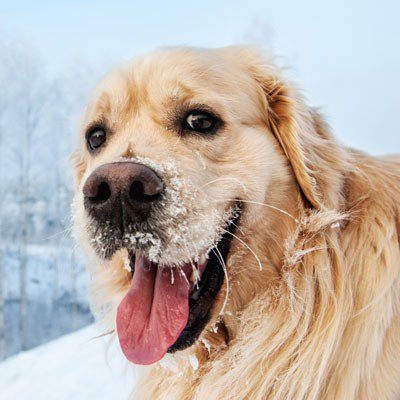Winter weather is upon us—will your pet be safe as the temperatures drop? Here, your Chesapeake, VA veterinarian gives you a few tips for keeping your pet safe this season.
Bring Your Pet Indoors
Rule number one during winter weather: don’t leave your pet outdoors for extended periods of time to brave the elements, even if they love frolicking in the snow. Prolonged exposure can lead to frostbite and deadly hypothermia. Keep outdoor adventures to 10 minutes or less when it’s cold outside; your pet will be happiest and safest indoors with your family.
Beware of Antifreeze
In the winter, car owners add antifreeze to their engine compartments. Don’t let your cat or dog anywhere near this substance—antifreeze contains ethylene glycol, an alcoholic substance that is highly toxic to pets. Even worse, it has a sweet taste that may attract pets. Keep pets indoors while using antifreeze, clean up any spills right away, and store the chemical where pets don’t have access.
Check the Hood
When the temperatures drop, smaller pets—as well as stray or feral cats—may curl up inside a parked car’s engine compartment or wheel wells to seek warmth. If an unsuspecting car owner starts the car and drives off without checking, these pets could be seriously injured or killed. To prevent this, always give your hood a few sharp raps before getting into your car. This will startle any stowaways into running off.
Avoid Deep Snow
Take care to have your pet avoid areas of deep snow. Even the most athletic pets can exhaust themselves trudging through the deep white stuff. Smaller pets may even fall into deep snowbanks and not be able to get themselves out!
Watch the Ice
Just like us, pets can slip and fall on patches of ice, possibly breaking bones, injuring paws, or hyperextending limbs. In addition, ice may have a chemical de-icer applied to it, and you don’t want your pet coming into contact with such a substance. Road salt can also be found on ice, which may stick to pets’ paws and be accidentally ingested later. To be safe, avoid all ice patches when outdoors with your pet.
These aren’t the only cold-weather hazards that pets face during the colder months. If you would like more advice on keeping your furry friend safe from harm when the temperatures drop, contact your Chesapeake, VA pet clinic today.









